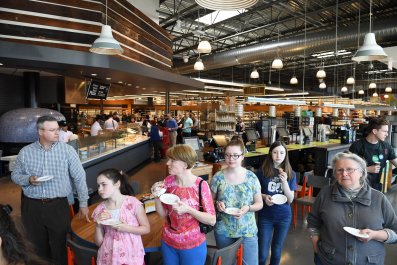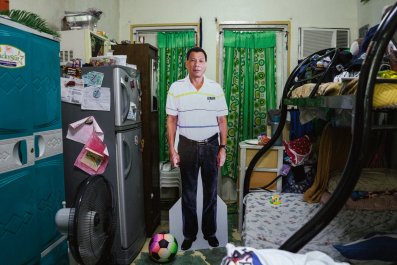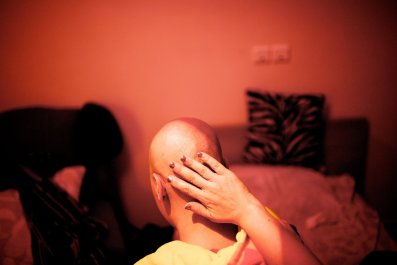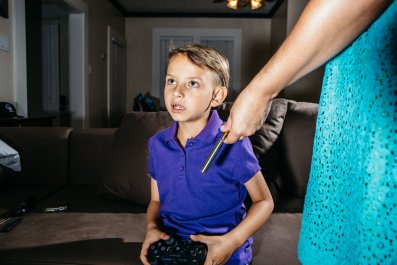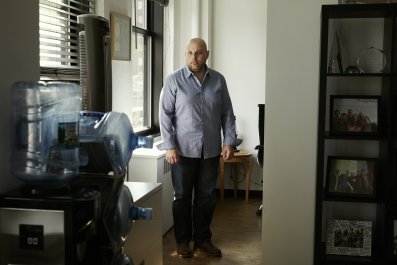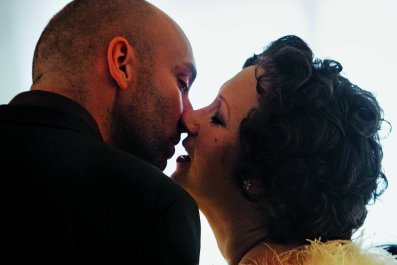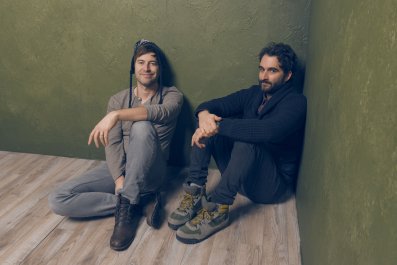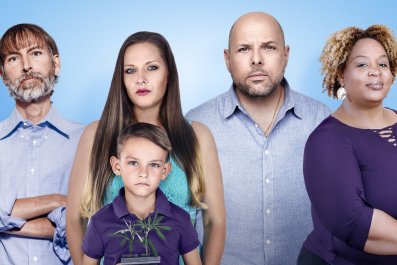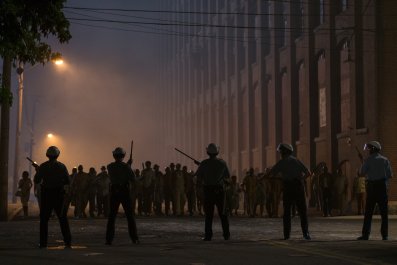When Tom Marsilje's cancer came back stronger in August 2013, he knew he would eventually have to turn to a clinical trial. These trials, which test the safety and efficacy of experimental new treatments compared with the standard of care, are not for every patient, because some types of cancer have good treatment options with strong outcomes. Marsilje's initial search returned 1,200 results. "With my patient hat on, I had no idea where you'd start. I assure you, there are not 1,200 clinical trials [worth considering]," Marsilje says. "One of the first things I realized was that I was really lucky in my background. I don't know how anyone without a scientific background would be able to do this. It's so complicated."
Marsilje—who took care of his mother before she passed away from pancreatic cancer and watched several other family members fight cancer—studied medicinal chemistry and became an oncology and drug discovery researcher at Novartis, working primarily on lung cancer. He helped design and synthesize a lung cancer drug. In June 2012, his colleagues presented their Phase I clinical trial data at the Annual Meeting of the American Society of Clinical Oncology. "It really had felt like we struck a blow to cancer," Marsilje says. Six hours later, cancer struck back. The 40-year-old Marsilje had a colonoscopy and got a diagnosis of Stage III colorectal cancer (CRC). He had surgery two days later. The cancer caretaker turned cancer researcher was suddenly a cancer patient. A short time later, he would also become a cancer activist, contributing one big solution to the daunting challenge many patients face of finding a clinical trial that offers them real hope.
It started with a spreadsheet he built to narrow down his list of prospects to a manageable size, parsing through data and doing weekly searches for new trials. His project grew into the Late-Stage MSS-CRC Trial Finder, launched in May in partnership with the advocacy organization Fight CRC and the health care technology company Flatiron Health. It offers patients and caregivers a curated list of trials for which they might be eligible, based on the same criteria Marsilje used to make his spreadsheet, such as whether it's open for recruitment, whether it might apply to CRC patients, its potential to benefit a late-stage patient and its risk of failure. It's for people like Marsilje's mom and anyone else who isn't being treated at a major cancer center that's adept at matching patients to the latest trials or anyone who finds the medicalese of clinical trial information indecipherable and overwhelming.
RELATED: What we know about how cancer starts could all be wrong
The most comprehensive database of clinical trials is maintained by the National Institutes of Health's National Library of Medicine at ClinicalTrials.gov. The website went public on February 29, 2000. It was billed then as a "consumer-friendly database" and won an Innovations in American Government Award in 2004. Though it continues to be a "great comprehensive resource," says Anjelica Davis, president of Fight CRC, "for patients it is still difficult," she says, because "understanding the nuances of clinical trials is difficult, especially in midst of treatment." It can be a struggle just figuring out whether a trial is open for recruitment, let alone weighing all the factors.
Over the past two decades, government bodies, advocacy groups and other nonprofits, as well as for-profit companies, have launched clinical trials matching services and tools to try to improve the experience for all patients or for subsets diagnosed with specific diseases. IBM has Watson for Clinical Trial Matching. PatientsLikeMe—a personalized health network and research company that has partnered with pharmaceutical companies, academic institutions and nonprofits—has a search tool. The Michael J. Fox Foundation for Parkinson's Research has the Fox Trial Finder. The American Cancer Society and Stand Up to Cancer have matching services, and there are a slew for specific cancer types.
Still, fewer than 5 percent of adult cancer patients participate in trials. Paul Wicks, PatientsLikeMe's vice president of innovation, explains that there are numerous barriers, including lack of awareness and understanding, geographic distance from trial centers, burdensome requirements and huge time commitments. A 2008 study found that more than 20 percent of trials sponsored by the National Cancer Institute failed to enroll a single participant, and just half recruited enough patients to achieve a meaningful result. For years, patients haven't been finding or participating in trials that could help them and researchers have struggled to recruit subjects.
"It's hard to build a general tool that makes it easy for everybody to find what they're looking for," says Warren Kibbe, director of the National Cancer Institute's Center for Biomedical Informatics and Information Technology. The NCI has long collected information about cancer clinical trials. At then–Vice President Joe Biden's Cancer Moonshot Summit last summer, the NCI not only launched a search tool, but also released a programming interface anyone can use to build new applications, integrations, search tools and digital platforms. "I think there's a real value in customizing that experience."
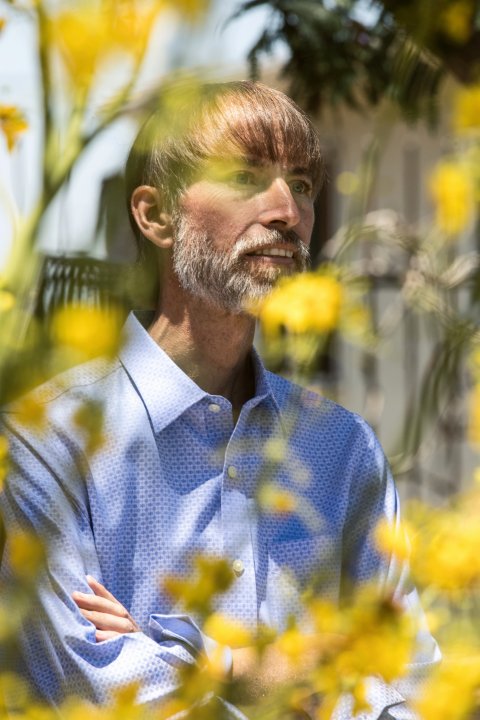
As both a patient and a scientist, Marsilje was in the perfect position to do so for the CRC community. But he didn't immediately become the activist he is now. For the first few years after his initial diagnosis, Marsilje wasn't symptomatic. He was juggling his full-time job with treatment and monitoring and still running about 20 miles a week. But in 2015, his symptoms were progressing, and he began joining online support groups, where he shared his spreadsheet. He also started a blog. It was meant to be a password-protected update for family and friends, but as he worked on his first entry, he thought of the blogs that had helped him after his diagnosis and of his rare perspective as both a researcher and a patient. "Very nervously, I decided to make my blog public," he says, explaining that he had been an introvert for most of his life, but "It's easier to be an extrovert behind the keyboard." The blog, Adventures in Living Terminally Optimistic, includes personal posts, as well as scientific ones. It became more popular than he'd ever expected—getting about 10,000 views per post from 150 countries and parts of it being translated into six languages. It led to columns on Fight CRC's site ("The Currently Incurable Scientist") and for the Philadelphia Inquirer. In the summer of 2015, he also helped found the Colon Town Clinic, a subgroup of the online community Colon Town run by scientists who can help patients and caregivers understand clinical trials.
In late 2016, a fellow activist from Argentina asked Marsilje if he'd like to turn his spreadsheet into an app. She wasn't a programmer but was able to make a rudimentary version using Appsheet. The results weren't pretty, but it had all the basics. He then reached out to Fight CRC, which he wanted to be the tool's home, and found Flatiron Health. "Every conversation you have with him is really inspiring," says Vineeta Agarwala, a product manager at Flatiron. They spoke on the phone and it quickly became clear that rebuilding the trial finder would be a perfect pro bono project for the company's next quarterly hackathon.
Marsilje didn't plan to attend the hackathon in New York City. He'd originally told the team he couldn't travel that far from his San Diego home. But the month before, poised for the second time to begin a clinical trial, his baseline CT scan showed that "my formerly very laid-back cancer suddenly exploded into a very aggressive cancer," with too many tumors on his liver to count. He and his oncologist decided to postpone the trial and go right back to chemo to get him out of a life-threatening situation; he was in New York City to get a second opinion at Memorial Sloan Kettering Cancer Center. The first time he'd been on the cusp of entering a clinical trial, in 2015, a doctor discovered Stage I melanoma. Though it has a 98 percent cure rate, a secondary cancer precluded his participation. Which means the ardent clinical trials advocate is still waiting for his chance to participate in one.
RELATED: A young leukemia survivor skipped chemo and took medical marijuana instead
In the midst of the turmoil in Marsilje's treatment, he arrived in the lobby of Flatiron Health. Upstairs, he kicked off the hackathon with a speech and then joined a smaller group of employees to huddle over the trial finder. "There wasn't a chair for everyone. At one point, Tom was sitting on the floor in a corner with two engineers hovering around him," Agarwala recalls, "trying to unpack how his brain did this curation." The programmers wanted to translate the questions Marsilje was asking and the decisions he made—like identifying which studies are immunotherapy trials and when trials are updated—into automated processes. Their code queries the ClinicalTrials.gov database and auto-populates results, but allows a human curator to review them and add more information before they go public. Users can print out lists to bring to their doctors.
The professionally coded iteration of the Late-Stage MSS-CRC Trial Finder, which went live on Fight CRC's website in May after additional tweaks and tests post-hackathon, is limited to trials for Stage IV CRC patients who have MSS tumors (microsatellite stable), like Marsilje. In other words, it's for a very specific subset of patients and returns a curated rather than comprehensive list of results. Since the launch, Marsilje has spent his time between chemotherapy appointments focusing on two main projects: training other advocates to oversee the curation process and bringing the same model to other cancer types. "There's absolutely nothing specific about the basic methodology. It can apply to any cancer," says Marsilje. "Patients are really much more empowered now. They're really able to have a bigger role in their own treatment plans." He attributes much of that to technology advances and social media. His and other clinical trial matching tools are making the process a little more manageable. "I couldn't imagine being a cancer patient 20 years ago," he says.
"Patients aren't stupid," he adds, and "they have the biggest impetus in the world to work hard to understand things, because it's their life on the line."






